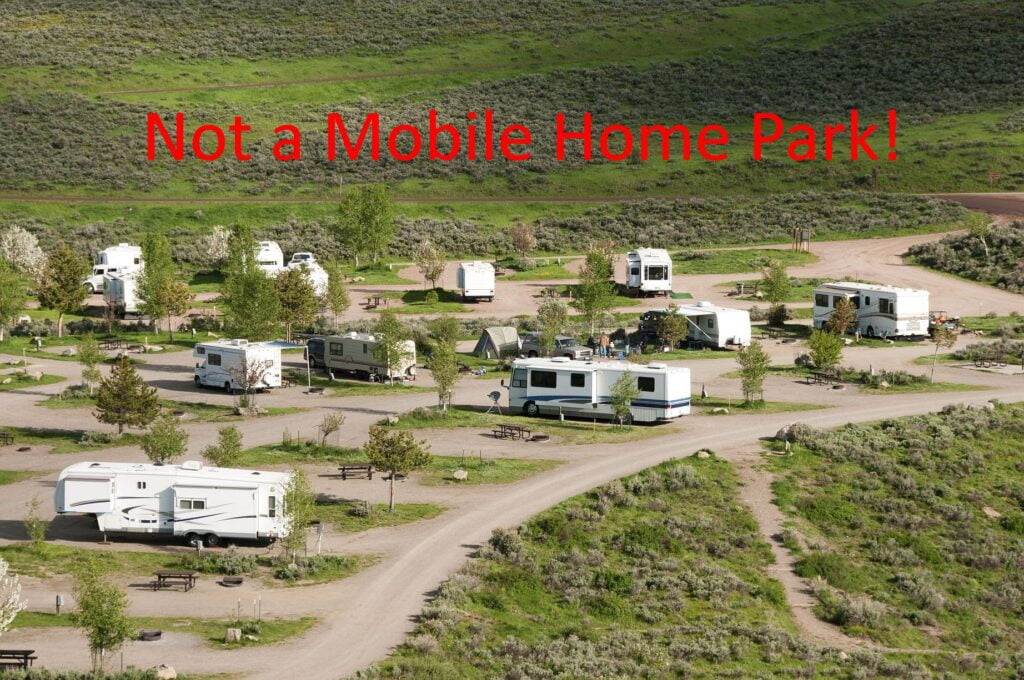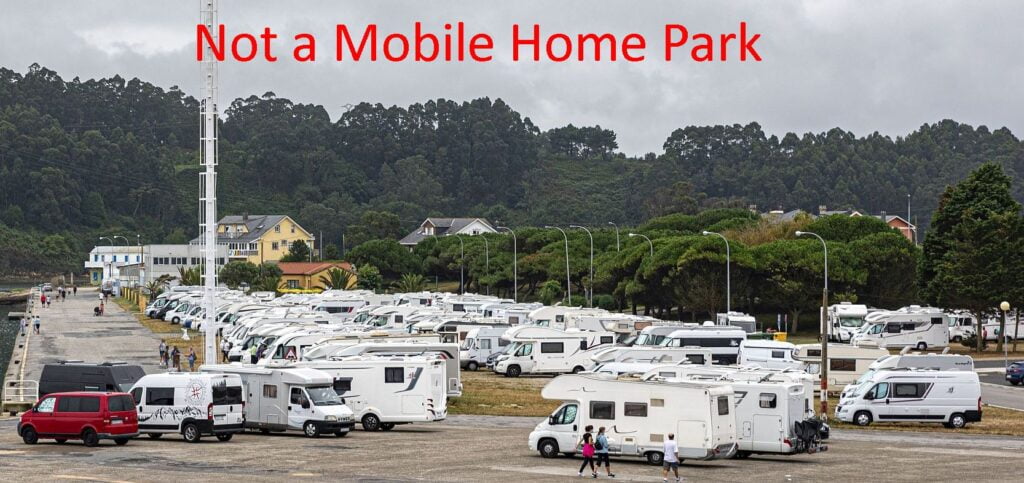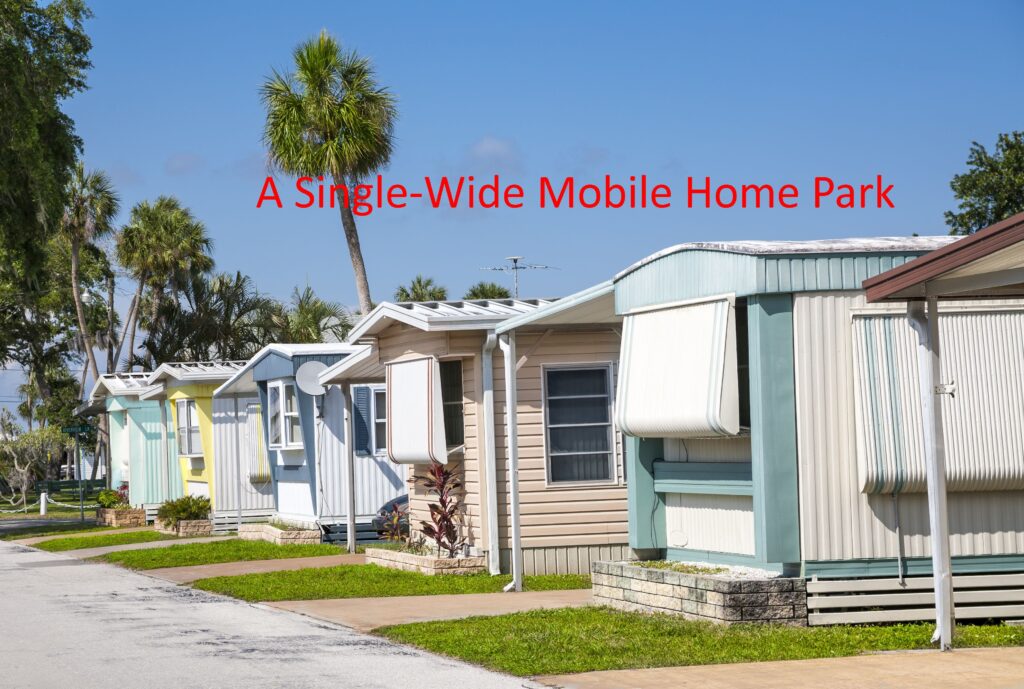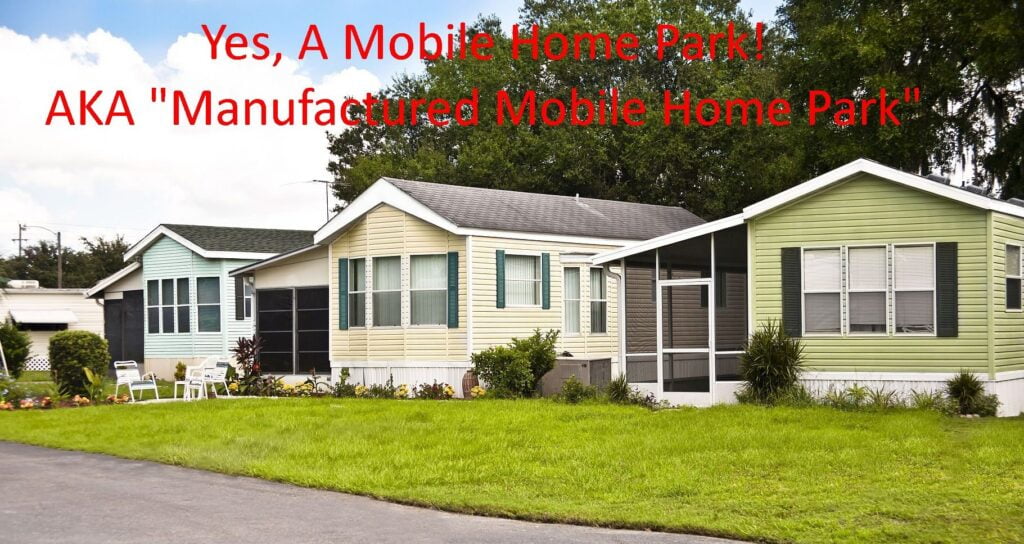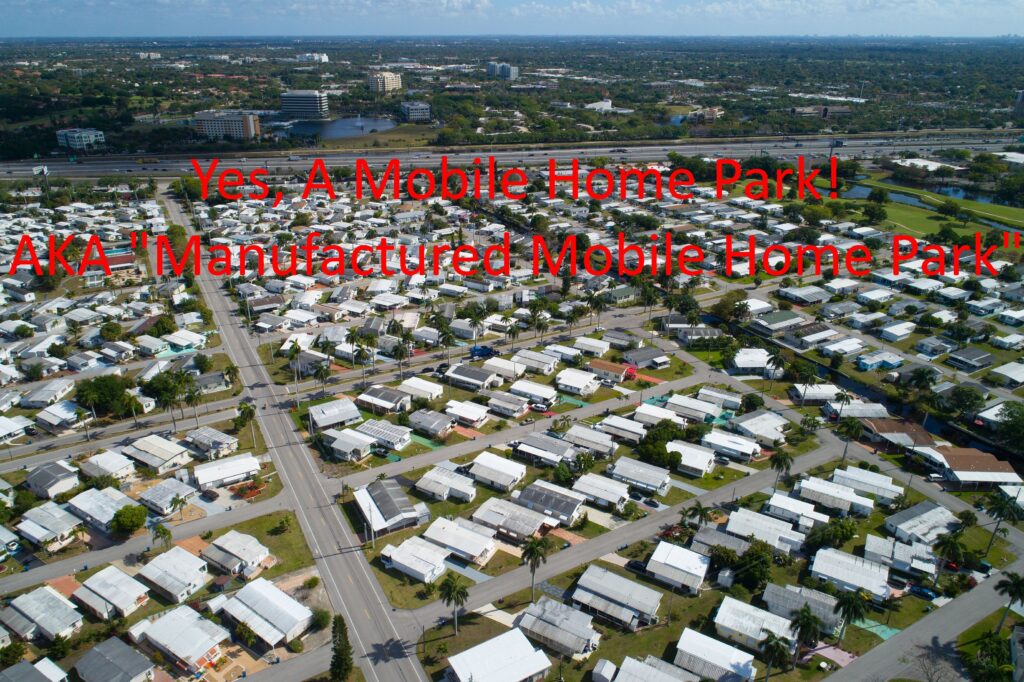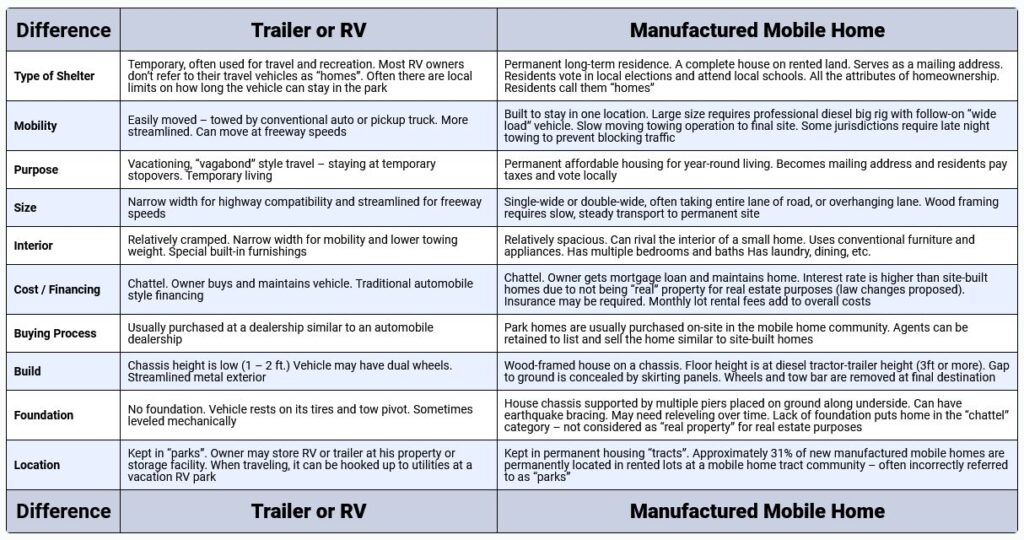Trailer Park, Mobile Home or RV Park – What is the difference?
If you search the internet for the term “mobile home” you will probably get contradicting and confusing results showing all kinds of movable shelter.
Manufactured mobile homes are not well categorized by their names alone – you have to see them to tell them apart. Too often they are regarded separately from the land, the contracts and the systems that actually makes this form of housing work. They should be thought of as integrated into a park system but they are often confused with travel trailers which are comparatively independent objects.
Whether you are looking at RVs, campers or manufactured mobile homes, they all rely on a place to park and hookup to utilities allowing the occupants comfort and rest. Some shelters are mobile and can move easily from park to park. Manufactured homes are practically attached to the park and do not move. These “parks” should more accurately be thought of as permanent housing “tracts”, similar to site-built housing tracts.
In a few parks, you can rent both the mobile home and the land entirely, like renting a cottage or standalone house. But most park landlords rent only the land and utility hookups – the resident buys and owns the house that is attached to the rented land.
The Basics of Mobile Home Parks – Buildings and Land
All housing is part of the larger system that must work well for successful living. That includes manufactured mobile homes. There is plenty to know about the homes and parks as an introduction to the entire system.
Not enough people understand this housing system, including civic leaders and those whose decisions affect many people. Inexperienced people may think they know enough about mobile homes and parks, but too often, more education is needed.
This form of housing is complex because it involves crucial details beyond just the homes. It is important for citizens to understand the land rental business and the risks and rewards of this form of housing.
There is much to know before making decisions about this form of housing. In other articles we will cover the park business, legal contracts and city planning. These subjects are important for the long-term success and prosperity of the local community.
Table: Differences Between Trailers and Manufactured Mobile Homes
Difference |
Trailer or RV |
Manufactured Mobile Home |
|---|---|---|
Type of Shelter |
Temporary, often used for travel and recreation. Most RV owners don’t refer to their travel vehicles as “homes”. Often there are local limits on how long the vehicle can stay in the park |
Permanent long-term residence. A complete house on rented land. Serves as a mailing address. Residents vote in local elections and attend local schools. All the attributes of homeownership. Residents call them “homes” |
Mobility |
Easily moved – towed by conventional auto or pickup truck. More streamlined. Can move at freeway speeds |
Built to stay in one location. Large size requires professional diesel big rig with follow-on “wide load” vehicle. Slow moving towing operation to final site. Some jurisdictions require late night towing to prevent blocking traffic |
Purpose |
Vacationing, “vagabond” style travel – staying at temporary stopovers. Temporary living |
Permanent affordable housing for year-round living. Becomes mailing address and residents pay taxes and vote locally |
Size |
Narrow width for highway compatibility and streamlined for freeway speeds |
Single-wide or double-wide, often taking entire lane of road, or overhanging lane. Wood framing requires slow, steady transport to permanent site |
Interior |
Relatively cramped. Narrow width for mobility and lower towing weight. Special built-in furnishings |
Relatively spacious. Can rival the interior of a small home. Uses conventional furniture and appliances. Has multiple bedrooms and baths Has laundry, dining, etc. |
Cost / Financing |
Chattel. Owner buys and maintains vehicle. Traditional automobile style financing |
Chattel. Owner gets mortgage loan and maintains home. Interest rate is higher than site-built homes due to not being “real” property for real estate purposes (law changes proposed). Insurance may be required. Monthly lot rental fees add to overall costs |
Buying Process |
Usually purchased at a dealership similar to an automobile dealership |
Park homes are usually purchased on-site in the mobile home community. Agents can be retained to list and sell the home similar to site-built homes |
Build |
Chassis height is low (1 – 2 ft.) Vehicle may have dual wheels. Streamlined metal exterior |
Wood-framed house on a chassis. Floor height is at diesel tractor-trailer height (3ft or more). Gap to ground is concealed by skirting panels. Wheels and tow bar are removed at final destination |
Foundation |
No foundation. Vehicle rests on its tires and tow pivot. Sometimes leveled mechanically |
House chassis supported by multiple piers placed on ground along underside. Can have earthquake bracing. May need releveling over time. Lack of foundation puts home in the “chattel” category – not “real property” for real estate valuation purposes |
Location |
Kept in “parks”. Owner may store RV or trailer at his property or storage facility. When traveling, it can be hooked up to utilities at a vacation RV park |
Kept in permanent housing “tracts”. Approximately 31% of new manufactured mobile homes are permanently located in rented lots at a mobile home tract community – often incorrectly referred to as “parks” |
Difference |
Trailer or RV |
Manufactured Mobile Home |
Click thumbnail below to enlarge
*According to the Manufactured Housing Institute, June 2023 report, 31% of new homes are placed in communities. According to statistics at MH Village, 27% of new manufactured are permanently placed into mobile home parks. The majority are assumed to be situated on private land owned by the mobile home owner. This web site is focused on homeowners living in a park where they rent land.
Tour a modern manufactured home.
What Are the Correct Names for Mobile Homes? The Confusion Persists
Manufactured mobile homes (built after 1976) have been given many common names. Sometimes they are erroneously called “trailers”. But the federal department of Housing and Urban Development (HUD) prefers to call them “manufactured homes” even though other types of homes are also factory-built or “manufactured”. HUD refers to these other types of factory-built houses as “modular” homes or “systems-built homes”. These “modular” or “system-built” houses typically consist of large factory-made pieces that are trucked to the house’s lot and assembled on-site into a building that is attached to a permanent cement foundation. In contrast, true “manufactured” homes rest on a permanent chassis about 3 to 4 feet off the ground. In HUD language, a “mobile home” is factory-built before 1976 when standards were lax and construction varied widely.
The U.S. Department of Housing and Urban Development sets manufactured housing standards and defines manufactured and modular homes:
What is a manufactured home?
A manufactured home (formerly known as a mobile home) is built to the Manufactured Home Construction and Safety Standards (HUD Code) and displays a red certification label on the exterior of each transportable section. Manufactured homes are built in the controlled environment of a manufacturing plant and are transported in one or more sections on a permanent chassis.
What is the difference between manufactured and modular homes?
Manufactured homes are constructed according to a code administered by the U.S. Department of Housing and Urban Development (HUD Code). The HUD Code, unlike conventional building codes, requires manufactured homes to be constructed on a permanent chassis. Modular homes are constructed to the same state, local or regional building codes as site-built homes. Other types of systems-built homes include panelized wall systems, log homes, structural insulated panels, and insulating concrete forms.
– U.S. Department of Housing and Urban Development
While HUD was able to standardize construction and establish minimums of quality, HUD failed somewhat in getting the public to correctly adopt the new names and conventions. Today, to some people, a manufactured home park, a mobile home park, a trailer park and an RV park are all the same. This widespread public misunderstanding inhibits manufactured homeowners’ ability to communicate their unique concerns.
In HUD language, a “modular” home is what is commonly referred to as a pre-built home, or “home in box” where the parts of the house are factory-built, transported via semi truck to the housing site, and assembled on a permanent foundation (usually cement). When the general public thinks of a house, they are usually thinking of what is commonly called “site-built housing” or “stick built” homes. Site-built houses are assembled from raw materials (lumber, nails, roofing tiles) onto a permanent cement foundation. We often think of construction workers nailing together lumber to build a site-built house.
Conventional homes are usually called “site-built” homes or “stick-built” homes. Conventional homes are constructed on-site from the raw materials and rest on a permanent foundation.
The misnaming and misunderstanding continues to this day. A key identifier is that manufactured mobile homes are built on an elevated chassis about 3 feet high and they remain elevated on piers or support pillars while in use. They require stairs to access their doorways. The open-air gap from the chassis to the ground is usually concealed by skirting.
To identify a manufactured mobile home, look for the elevated chassis floor, approximately 3 feet high, and three or more stair steps leading to external doors. This is the quickest way to identify these homes.
Comparing the Four Kinds of Owned Shelter – Houses, Modular Homes, Manufactured Homes and Trailers / RVs
- House: The common understanding of a house is that of a “site-built” or “stick-built” house permanently constructed at a location on top of a cement foundation using raw materials – lumber, nails, roofing, etc. They are not pre-assembled.
- A “modular” house, as defined by HUD, is also constructed on a permanent cement foundation but from pre-assembled parts or modules made in a factory and transported to the site by semi-truck.
- A “manufactured” house, as defined by HUD, is entirely pre-assembled in a factory on a permanent chassis and is slowly towed by semi truck to a manufactured home park (or private land). It is narrow enough to be transported on public roads. It remains on the chassis several feet off the ground, supported by piers. Several of these long rectangular units can be put together to make a a “double wide” or even “triple wide” house.
Even though there is no cement foundation, these manufactured houses are designed to stay permanently placed and are expensive to move, even risky to move. Once placed, the tires and axles are often removed. The “parks” they are placed in are actually permanent housing tracts, often designed for manufactured homes with metered utilities, mail boxes and permanent addresses. You can identify these houses by their elevation off the ground (approximately 3 feet) and no apparent trailer hitch or tires. - Trailers or Recreational Vehicles (RVs) or tiny homes, campers, and vans are all designed for easy freeway travel. They are primarily made for vacationers or vagabond sightseers. The have permanent axles, tires and hitches and are very narrow for freeway maneuverability. Vacationers use trailers and RVs to stay in a RV park for relatively short periods. Some parks may allow residents to stay for long periods with their trailers and this may be how manufactured homes become confused with trailers and trailer parks.
- “Mobile home” is mostly an outdated term, according to HUD. It applies to those manufactured houses built before 1976 when HUD established quality and safety standards and referred to manufactured homes on chassis built after June 15,1976 as, indeed, “manufactured homes”. There are pre-76 mobile homes in use today but mostly they have been replaced by the more modern houses. However, the term “mobile home” and even the derogatory “trailer” are often misapplied to these beautiful. and practical houses.
The proper term for a mobile home is manufactured home. Terms like a trailer, trailer park, and even mobile home are no longer politically correct, but the public has been slow to adopt the proper term, “manufactured home.”
– Allen Semelsberger Kaelin, LLP, June 17, 2022
The takeaway is that manufactured houses are permanent houses in permanent housing tracts where the homeowners are permanent citizens of the local community and vote in local elections. They have permanent mailing addresses, pay utility bills and local taxes (even mortgages and property taxes!) and their children may attend local public schools. They are as much citizens and contributors to the community as residents in site-built houses and should be respected and treated as such.
Typical Questions About Manufactured Mobile Homes
- What exactly is a mobile home park? What are the myths about mobile homes and parks?
- How can you identify a manufactured house?
- Which kind of shelter is best to live in?
- What are the two important components to living in a mobile home park?
- What is the source of the stigma and common misunderstandings about people living in smaller homes?
- Why do people keep calling them “trailer parks” when “trailer parks” are practically obsolete and hard to find? Why are they mistaken for RV parks?
- Are right-sized manufactured homes a solution to overdevelopment?
The US Department of Housing and Urban Development provides the online publication “PD&R Edge” where Todd M. Richardson, General Deputy Assistant Secretary for Policy Development and Research published an overview of the evolution of manufactured housing and its naming conventions: Factory Built Housing: A new age of experimentation.
These are questions needing better answers. Consumers that want to be well-informed can start by learning the facts about the buildings and land in manufactured mobile home parks. Accurate knowledge will help concerned citizens make better civic decisions and free themselves from dependence on salesmen and park employees for advice and information.
Below are more questions and subjects that readers can explore.
Types of Smaller Homes in Mobile Home Parks
- How do you identify the various kinds of movable shelter?
- Manufactured mobile home construction – What is different from a site-built home or an RV or trailer?
- Are newer manufactured homes better?
- What are manufactured mobile homes constructed of?
- What manufactured home brand should I buy? What is the best manufactured home?
- What qualities should I look for?
- What are the conditions that homebuyers often fail to notice?
- What are tiny homes and how do they compare to manufactured mobile homes?
Mobile Home Parks and Their Purpose
- Why do parks exist? Why not some other way?
- What do buyers often overlook?
Mobile Home Park Types
- How do you identify the types of parks? Which kind is best to settle in?
- What are mixed parks?
- What is an RV Park?
- What is a “trailer park”?
- How do you tour a mobile home park? What to look for when visiting
Moving a Manufactured Mobile Home
- Why you don’t just buy a mobile home by itself?
- How do the homes get into the parks? Learn about manufactured mobile home transport
- Why is it so expensive to move a manufactured mobile home?
- Can I move my mobile home to another park?
Stigma, Notions, Culture Problems About Mobile Home Parks
- Why is there stigma about smaller housing?
- Why don’t they clean up?
- Why are the homes so old?
- Why are some parks so run-down?
Environmental Benefits of Mobile Home Parks
- How do mobile home parks solve land wastage and density issues during a housing shortage and crisis?
- How do mobile home parks solve environmental problems and global warming?
- What kind of support can I get for buying a smaller, greener home?
Protections, Proposed Changes, Future Predictions About Mobile Home Parks
- Are mobile homes “affordable housing”? Does your government recognize them as “affordable Housing” stock?
- What ways are park homeowners protected?
- What if my park owner goes out of business and closes the park?
- What is a senior overlay protection?
- What is rent stabilization protection?
- What are resident-owned communities?
- What additional protections may apply?
- Is my pension fund investing in rent park raises?
- Are my US government’s agencies helping investors raise my rents?
Additional Benefits of Mobile Home Parks
- Can a manufactured home actually be superior in some ways?
- How can I best preserve my manufactured mobile home from deterioration?
- How can I best maintain the resale value of my manufactured mobile home?
- What should I know about buying and selling a mobile home?
- A glossary of mobile home park terminology – learn the right words

